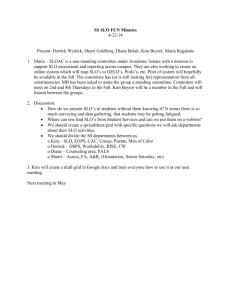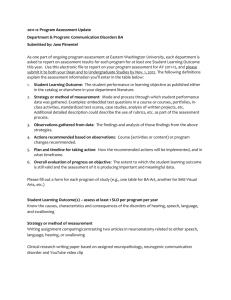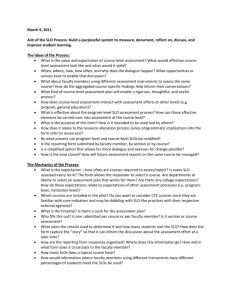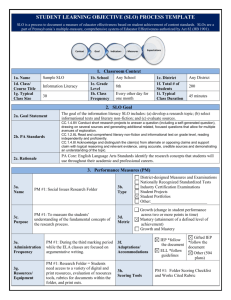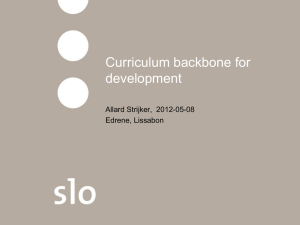Program/Department Identified Student Learning Outcomes
advertisement
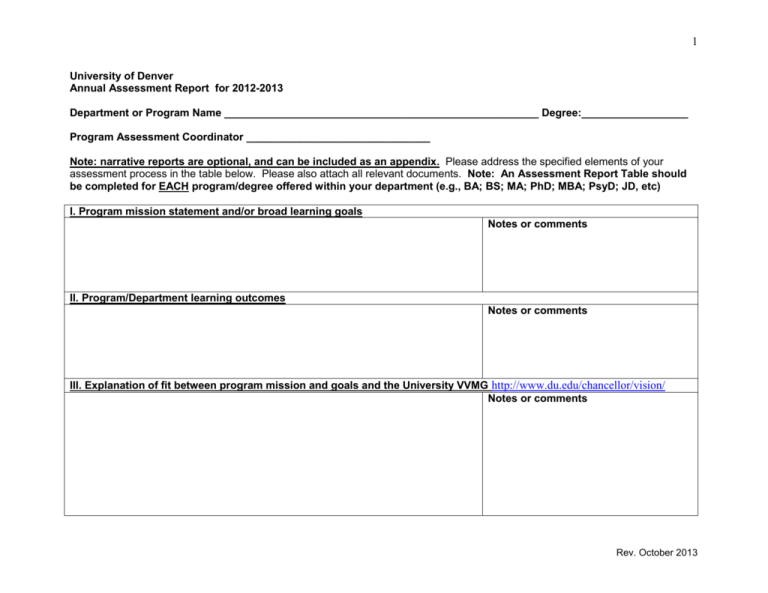
1 University of Denver Annual Assessment Report for 2012-2013 Department or Program Name _____________________________________________________ Degree:__________________ Program Assessment Coordinator _______________________________ Note: narrative reports are optional, and can be included as an appendix. Please address the specified elements of your assessment process in the table below. Please also attach all relevant documents. Note: An Assessment Report Table should be completed for EACH program/degree offered within your department (e.g., BA; BS; MA; PhD; MBA; PsyD; JD, etc) I. Program mission statement and/or broad learning goals Notes or comments II. Program/Department learning outcomes Notes or comments III. Explanation of fit between program mission and goals and the University VVMG http://www.du.edu/chancellor/vision/ Notes or comments Rev. October 2013 2 IV. Assessment activities: For each student learning outcome Notes or comments A. Findings for each student learning outcome: Learning Outcome 1:_______________________________________ a) assessment methods/procedures and measures (direct/indirect) b) evaluative criteria (rubrics; instruments) c) data summary (raw data in appendix, optional) Learning Outcome 2:_______________________________________ a) assessment methods and measures b) evaluative criteria (rubrics; instruments) c) data summary (raw data in appendix, optional) and so on for EACH student learning outcome B. Comparison of this year’s assessment findings with previous years: V. Faculty Discussion Of Assessment Findings and Recommendations Notes or comments Rev. October 2013 3 VI. Description of pedagogical, programmatic and curricular changes planned or undertaken as a result of assessment (closing the feedback loop) Notes or comments VII. Map of program outcomes onto DU Undergraduate and/or Graduate-Professional Student Learning Outcomes (see blank templates for Undergraduate and Graduate-Professional Student Learning Outcomes followed by examples; ) Rev. October 2013 4 DU Graduate-Professional Student Outcomes Mapped onto ____________________________ Program/Department Identified Student Learning Outcomes Program/Department Identified Student Learning Outcomes DU Graduate/Professional Student Learning Outcomes (5/09) SLO #1 SLO #2 SLO #3 SLO #4 SLO #5 Advanced Theoretical/Disciplinary Knowledge and Skills Through Discovery, Application, and Expression Professional/Ethical Identity, Values and Leadership Intercultural and Local/Global Engagement Critical Intellectual Engagement Program/Department Student Learning Outcome (SLO): 1. 2. 3. Rev. October 2013 5 DU Graduate-Professional Student Outcomes Mapped onto Program/Department Identified Student Learning Outcomes August 2009 Examples for Various Program/Departments DU Graduate/Professional Student Learning Outcomes (5/09) Advanced Theoretical/Disciplinary Knowledge and Skills Through Discovery, Application, and Expression Professional/Ethical Identity, Values and Leadership Intercultural and Local/Global Engagement Critical Intellectual Engagement Graduate School of Social Work MSW* Psychology PhD Marketing MS Geography Library and Information Science MLIS 1, 2, 3, 4, 5 x x x x 1, 2, 3, 4, 5, 6 x x 1, 5 x x x x 2, 3, 6 x x x x Your Program/ Department x *Graduate School of Social Work outcomes for the MSW The program objective is to graduate students who will: 1. Engage in ethical, culturally responsive advanced clinical or community practice that emphasizes strengths of individuals and communities. 2. Critically evaluate and ethically apply the major theories related to human development and behavior that guide advanced clinical or community social work practice. 3. Identify, select, and ethically apply advanced skills in assessment, intervention, and client advocacy in clinical or community social work practice. 4. Base advanced clinical or community social work practice on empirical evidence and evaluate the effectiveness of interventions and programs with consideration of values and ethics. 5. Analyze policy and identify strategies for advocating for policy that promotes social and economic justice, eliminates oppression, fosters the public good, and enhances the welfare of clients. 6. Demonstrate commitment to lifelong learning, the development of knowledge, and the profession of social work. Rev. October 2013 6 DU Undergraduate Student Outcomes Mapped onto _________________________ Programs/Department Identified Student Learning Outcomes Program/Department Identified Student Learning Outcomes DU Student Learning Outcomes (5/07) SLO #1 SLO #2 SLO #3 SLO #4 SLO #5 Epistemology and Inquiry Quantitative Reasoning Communication Intellectual Engagement and Reflection Engagement with Human Diversity Community Engagement Disciplinary Knowledge and Practice Program/Department Student Learning Outcome (SLO): 1. 2. Rev. October 2013 7 DU Undergraduate Student Outcomes Mapped onto Programs/Department Identified Student Learning Outcomes May 2008 Examples for Various Program/Departments DU Student Learning Outcomes (5/07) Epistemology and Inquiry Core Curriculum Cherrington Global Scholars Pioneer Leadership Program Engineering Major* Marketing Major x x x 1, 2 x 1, 2, 8 x x 3, 5 x x x 7 x x x 4, 6, 8 x Quantitative Reasoning Communication x Intellectual Engagement and Reflection x Engagement with Human Diversity Community Engagement Disciplinary Knowledge and Practice *Engineering program outcomes: Your Program/Department x x 1. 2. 3. 4. 5. 6. Students will have the ability to identify and formulate solutions to engineering problems. Students will have the ability to develop optimal solutions to engineering problems. Students will have the ability to function on multidisciplinary teams. Students will apply their knowledge of professional and ethical standards. Students will have the ability to communicate effectively. Students will employ knowledge of contemporary issues and their broad general education to assess the impact of engineering solutions in a global, economic, environmental, and societal context. 7. Students will recognize the need for and have an ability to engage in life-long learning. 8. Students will have the ability to use the techniques, skills, and modern engineering tools necessary for engineering practice. Rev. October 2013


